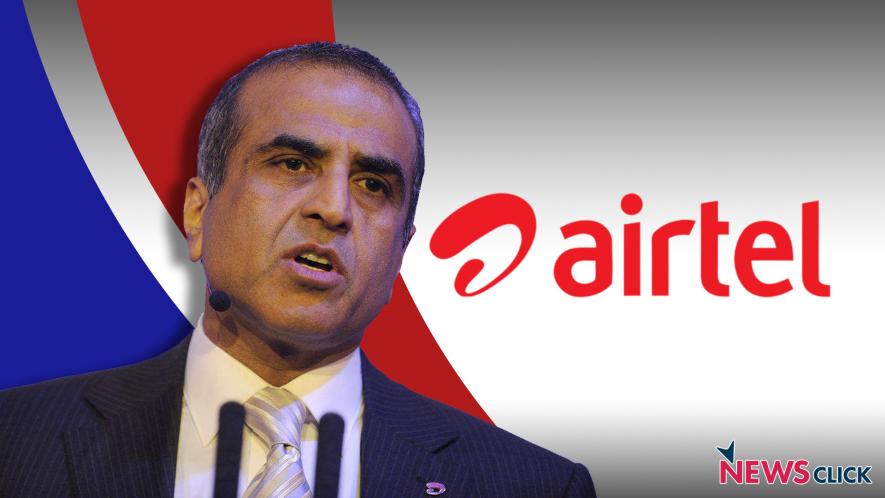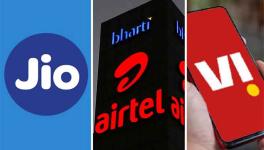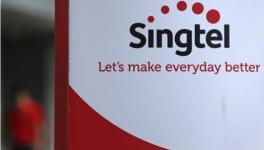Is Bharti Airtel Short-Changing its Minority Shareholders?

Even as Reliance Jio threatens to devour its competitors, including the leading telecommunications brand, Airtel – which has alleged that the petroleum and petrochemicals-funded, Mukesh Ambani-owned, Reliance Industries Limited has indulged in predatory practices – Sunil Bharti Mittal, chairman of Bharti Telecom Limited (or BTL, Airtel’s holding company) has been accused of “oppressing” minority shareholders in a “squeeze-out” manoeuvre. While a BTL spokesperson told NewsClick that the company has scrupulously followed the letter of the law, its promoters appear to winning the battle against some of its small shareholders.
A majority of shareholders of BTL, the promoter company holding 50.1% of group flagship Bharti Airtel, has passed a special resolution to extinguish 1.09% shares held by BTL’s minority shareholders via a capital reduction scheme. A non-government organisation, the Indian Investors’ Protection Council (IIPC), that had been condemning this move ever since the company issued a notice to this effect, is upset on several counts but is particularly unhappy that the price offered to minority shareholders to exit BTL is extremely low. The offer that has been made by brokers to the minority shareholders has apparently been mandated by the company to secure the exit of 4,942 “identified shareholders” in BTL.
A company spokesman said the special resolution has received overwhelming support from BTL shareholders and that “the company, in accordance with this mandate, will proceed ahead with the proposal.”
This episode highlights an oft-discussed issue of how minority shareholders can be “oppressed” by the brute force of the majority shareholders in a company if they first gang up against them and then team up with loyal brokers to impose their will on the hapless minority – a David versus Goliath story with a twist, in that Goliath is the victor.
This is exactly what seems to have happened in the Bharti Telecom case, or so alleges IIPC. The so-called act of oppression came through a special resolution moved under Section 66 of the Companies Act, 2013, to bring about “selective” and “discriminatory” reduction of capital, allegedly aimed at depriving small minority shareholders of their rights to seek a fair and transparent valuation of their holdings.
IIPC has claimed that Bharti Airtel group chairman Mittal has acquired total control of BTL in “collusion” with SingTel – the Singapore-based telecom conglomerate which is one of Asia’s biggest – and other companies in the Bharti group together with “trader investors”. Criticising the way in which BTL calculated the prices of shares held by minority shareholders to “force” their exit, IIPC argued that the company should have offered a “premium” price for the shares instead of an “oppressive” one.
It may be recalled that when, in October 1999, Bharti Telecom delisted its shares from the Bombay Stock Exchange, it made an open offer at a price of ₹95 a share, a price that was increased by a rupee subsequently. Many shareholders did not participate in the 1999 buyback offer while others joined the ranks of the company’s shareholders through private purchases.
Arvind Gupta, a trustee of the IIPC ¬– who, incidentally, also blew the whistle on the business deals involving former ICICI Bank head Chanda Kochhar’s husband and relatives and the Venugopal Dhoot-led Videocon group ¬– alleged in a letter to Mittal that “post-delisting in 2000, the genuine leftover small shareholders never ever had any rights and locus in the growth of Bharti Telecom Limited.”
These shareholders, scattered all over the world, can hardly be expected to contest the violation of their rights as enshrined in the Companies Act even as a “gang of management-patronized market traders” bought out the holdings of small shareholders in BTL at throwaway prices, Gupta claimed in his letter (a copy of which is with the writers).
According to a report prepared by IIFL Institutional Equities (IIE) – IIFL is part of India Infoline, a Mumbai-based financial services group – BTL’s public shareholders were provided an exit opportunity till June 2002 and the current minority shareholders had not availed of that opportunity at the time of delisting and were among “those who have become shareholders through private dealings/off-market dealings amongst remaining public shareholders.” IIE held that post-delisting, “these minority shareholders do not have any avenue to monetize their shareholding.” Accordingly, by undertaking a capital reduction, BTL is effectively providing them an exit route.
IIPC counters the position of IIE by arguing that the exit route amounts to a “coercive” buyout being affected by the Bharti and Singtel groups by “abusing” the provision relating to reduction of capital under Section 66 of the Companies Act, which the small shareholders have rejected “lock, stock and barrel”. The special resolution is “discriminatory and exploitative,” it is alleged.
The majority shareholders, accused of acting in concert against small shareholders, include companies in the Bharti group – such as Bharti Enterprises (Holdings) Private Limited and Indian Continental Investments Limited, together holding 50.01% of BTL – and the SingTel group – comprising Pastel Limited, Magenta Investments Limited and SingTel International Investments (P) Limited, together holding 48.9% of the company).
The Bharti Telecom spokesperson categorically said that the company “initiated this process on the basis of requests from minority shareholders to provide them an exit. …The company had approached its shareholders to approve the proposal vide (a) special resolution. Though legally not mandated to do so, the company, as a matter of good corporate governance, had voluntarily decided to proceed with the resolution, once the ‘majority of the minority’ shareholders approve the same. The resolution has been duly approved with the overwhelming support of minority shareholders.”
Apparently, not all minority shareholders have showed such “overwhelming support” and have been protesting against those collectively holding 98.91% of Bharti Telecom by accusing them of promoting a common objective of buying out the remaining 1.09% of the company’s equity held by 4,942 identified shareholders and seeking to impose a forced exit on them under the provisions of Section 66 for uniform reduction of capital.
This action is considered by IIPC as an “abuse” of Section 66 which seeks to enable non-discriminatory reduction of capital under various given circumstances. The NGO has argued that “selective” capital reduction, as the BTL management is seeking to undertake, is legally untenable and violates the provisions of the Companies Act and hence, the special resolution is “unfair, unjustified and illegal.” It further contended that the mandate given to Ernst & Young (E&Y) Merchant Banking Services Limited to determine the consideration to be paid for the reduction of equity capital serves as an acknowledgement of this charge because it seeks to effect “selective capital reduction.”
E&Y valued Bharti Telecom shares at ₹262.4 per fully paid-up share from which was deducted a 25% discount for lack of marketability (DLOM) – which, according to IIPC, was untenable and uncalled for – assessing the fair value per share at ₹196.80. IIPC has alleged that “in derogation of the existing tax laws, the Bharti Telecom management will further squeeze dividend distribution tax (DDT) from the proceeds of the small shareholders amounting to ₹33.55 per share,” which leaves them with a price of ₹163.25 to be paid to extinguish their shares. IIPC held that the DDT is the liability of the company and should not be borne by small shareholders.
The BTL spokesperson said this can no longer be a bone of contention because the exit price of ₹196.80 includes the DDT of ₹33.55 per share which is payable by the company on account of the shareholders. He emphasised: “It may be noted that the minority shareholders would not be subject to capital gain taxes on the amounts received, which would normally be applicable in a direct sale scenario.”
In another twist to the share price determination tale, IIPC pointed out that on 19 January 2018, BTL raised funds through a preferential issue of capital when its chartered accountants determined the company’s share prices at ₹310 on the basis of an “internationally accepted pricing methodology” and that SingTel paid this amount. Yet when it came to paying the minority shareholders an “oppressive consideration” has been offered.
IIPC further claims that the price paid to minority shareholders is all the more oppressive because the Bharti Telecom management rendered its shares illiquid by choosing not to pay any dividend on them prompting the merchant bankers to company to impute the DLOM discount. In any event, even this discount was calculated on the basis of standards applicable to developed economies and for “irrelevant” periods of time, that is, between 1966 and 2006 “in respect of historic market discount data for 19 companies in various countries.” The method makes the discount discriminatory and arbitrary and amounts to a “fraud on small shareholders being coercively thrown out of the company,” the NGO alleged.
A company spokesman argued that the valuation of BTL shares at the time of the preferential offer to SingTel in January 2018 is not comparable with the present valuation. This is what was stated by the spokesperson in an e-mail to one of the writers of this article: “The transaction with SingTel was a bilateral one, which took place at the then prevailing market price of Airtel, that is, ₹500 plus (that is, when [the] Airtel [scrip] was trading at an all-time high …[in] recent times), which translated into a BTL share price of ₹310 per share. The proceeds of the preferential allotment had gone towards deleveraging the [company’s] … balance sheet and which thereby aided the equity valuation for all the shareholders, including the minority shareholders. Since January 2018, telecom [company] stocks have all declined by around 30% levels given the continued tariff wars leading to [a] steep drop in stock price[s].”
The IIFL Institutional Equities report valuing the offer has also recommended this price: “Given that BTL is not listed and hence illiquid, we think that the exit price is attractive for minority shareholders and hence there is a good chance of approval. (The holdings of) SingTel and the Mittal family will reach 39.77% [from 39.50%] and 27.36% [from 27.09%] stake in Airtel respectively. This would also result in a simpler holding structure for BTL.”
Even so, Sunil Mittal could have been somewhat more generous by way of giving a generous premium to soothe the parting pangs of the minority shareholders who had not sought an exit from the company. Some of these shareholders, it can be argued have been, if anything, loyal to the Bharti group management that the IIPC now claims had harboured a gang of “management-supported identified shareholders” who would have got the “coercive” special resolution passed by the requisite majority of shareholders, as they did.
IIPC has alleged that over the years this so-called gang of trader-investors/shareholders had been acquiring shares from gullible shareholders on behalf of the company and that only if the “majority of the ‘real’ minority shareholders” could have decided against the resolution, it may have been dropped. The apparently overwhelming support of minority shareholders thus conveniently papers over “the premeditated scheme of beheading the real minority shareholders” who have been loyal to the Bharti Airtel group over the years, it has been claimed.
The group management may do well to keep in mind instances of interventions by courts, tribunals and the capital market regulator to protect the interests of minority shareholders by ensuing fair valuation of shares for buy-outs and buy-back/exit options. Company managements offer a premium to secure the exit of small shareholders to spare themselves the ignominy of having courts, tribunals and the Securities and Exchange Board of India intervening. The price reductions proposed have to be confirmed by the National Company Law Tribunal (NCLT) which will do so only if it is convinced that there has been no unfairness and that the scheme will not work inequitably.
Some of the “genuine” minority shareholders of BTL believe they should not only have been given an exit premium but also a premium for the “scarcity value” of the shares of Bharti Telecom shares. Time will tell whether the NCLT will become the final arbiter of this dispute.
Get the latest reports & analysis with people's perspective on Protests, movements & deep analytical videos, discussions of the current affairs in your Telegram app. Subscribe to NewsClick's Telegram channel & get Real-Time updates on stories, as they get published on our website.
























